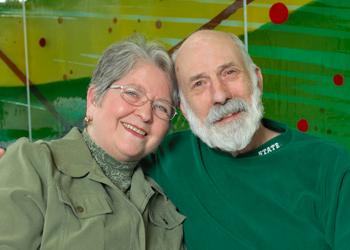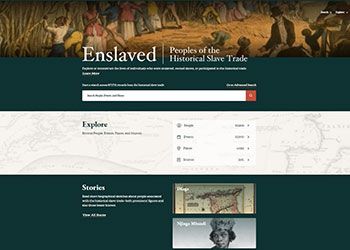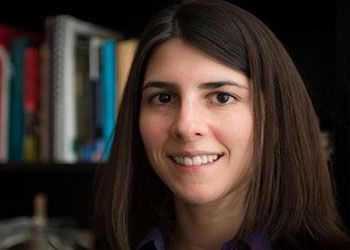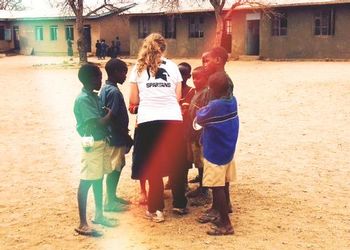Masters of Fate
MSU students are ready to lead global sustainability with new endowment support
October 10, 2014
Taking the slogan “Go Green” to the next practical level, Michigan State University will extend its socio-economic, physical, and natural science−based insights to more students and to the greater community in an effort to address issues of global sustainability, supported with generous gifts from a retired professor and a former MSU Trustee.
Donald (Don) F. Koch, MSU Professor Emeritus of philosophy, and Barbara J. Sawyer-Koch (’90, M.P.A., Social Science), have established several significant current and planned gift endowment funds, the major gift being titled Fate of the Earth.
Although their lives began at opposite ends of the country—Don is a native of California, while Barbara is a fifth-generation native of Menominee County in Michigan’s Upper Peninsula—they share a passion for the environment and recognize the significant negative impacts that climate change, and air and water degradation will have on future generations.
With their Fate of the Earth Endowment, the Koch’s hope to encourage today’s students and tomorrow’s leaders to understand the critical need for societal changes and take the necessary steps to prevent further destruction of the Earth’s fragile environment.
“Barbara Sawyer-Koch’s and Don Koch’s generous support of a multitude of MSU initiatives enables the university to establish and strengthen programs that will advance our world-grant mission,” says MSU President Lou Anna K. Simon. “The Koch family’s mission is to have a profound influence on the world—now, and long after they have left this Earth. The Fate of the Earth Endowment and their other planned gifts will certainly ensure that.”
Professor Koch, a graduate of Pomona College and Claremont Graduate School, is a nationally recognized scholar of American philosopher John Dewey. He believes that philosophers should be more concerned about tackling real-world issues—as was John Dewey, whose basic tenet involves the use of scientific inquiry as the best method for resolving problematic situations. “This has been the driving force in my research and teaching since graduate school,” says Don.
A number of years ago, when Don read the book titled The Fate of the Earth, by Jonathan Schell, it led him to compare the potential threat of nuclear holocaust—the subject of that book—to what civilization inflicts on the environment on a daily basis.
Barbara and Don’s decision to make MSU the primary beneficiary of their estate stemmed from their growing concern about national and state policy decisions and political statements that contradict scientific findings about climate change. They fear that this has led to a majority of Americans being misinformed.
“This is a sociological problem that requires a more informed citizenry to demand action—and to do it now,” says Barbara. “Recognizing the limited horizon within which to implement solutions, we have opted to gift sufficient cash now so that we may experience the transformative impacts while we are alive.”
The Kochs realized that MSU’s research and outreach strengths, and opportunities for cross-fertilization of ideas among the colleges addressing sustainability, aligned with their own goals. They were especially drawn to the interdisciplinary approach of MSU’s Environmental Science and Policy Program (ESPP).
“The potential for collaboration at MSU is, in our opinion, a necessary prerequisite to identifying and implementing solutions,” says Barbara. “Reversing the course that we’re on, which is threatening sustainability globally, requires a coherent and comprehensive social, political and economic response.”
Having served on the MSU Board of Trustees for 16 years (1980-1996), Barbara remains active in a number of MSU activities, including serving on the College of Social Science Alumni Board. Her community activism underpins the endowment component, which will make possible the sharing of factual, sciencebased information about the environment with the MSU campus, the greater Lansing community and—utilizing communication technologies—the world.
“The Fate of the Earth Endowment has been crafted to take advantage of the incredible interdisciplinary efforts at MSU,” she says. The Kochs hope to harness the integration of knowledge among MSU faculty and students with insights from world-class environmental scholars sharing technological, ethical and policy perspectives. ESPP has begun designing the academic program, with implementation planned for spring term 2014.
“We would like to build a cadre of students involved in all varieties of sustainability initiatives who are well-informed, have inquiring minds and know what questions to ask going forward,” says Don. “We are greatly inspired by the undergraduate students in RISE (Residential Initiative on the Study of the Environment) and STEPPS (the Science, Technology, Environment and Public Policy Specialization program in James Madison College), for example, who take both the problem and designing practical solutions as their personal quest.”
Specifically, the endowment will bring noted world scholars to MSU to speak to students and faculty about sustainability, with programs taped for sharing electronically worldwide. The endowment will also create cross-disciplinary “expert pods” of faculty members who will be called upon to provide an environmental perspective for diverse courses across campus. It will also support an annual Donald Koch Distinguished Lectureship, which will be open to the community, and a graduate assistantship to facilitate these programs.
In alignment with the Fate of the Earth Endowment, the Kochs established the Koch Environmental Studies Spartan Scholarship Challenge award in 2010. This needs-based scholarship is awarded to freshman or sophomore undergraduate students, with priority given to students in RISE, STEPPS or MSU’s sustainability specialization. The endowed scholarship currently helps fund five students with scholarships of up to $3,000 a year throughout their academic career at MSU.
Engaging with international students is among the Kochs’ other interests. They have provided complimentary housing and friendship to a large number of international students/houseguests over the past 25 years. They relish their two Korean “granddaughters,” now living in Okemos, and numerous progeny of their extended international family, with whom they visit on their world excursions. To complement Barbara’s work with MSU’s Community Volunteers for International Programs (CVIP), the Koch family is working with MSU’s International Studies and Programs on an endowment benefiting international students.
In recognition of outstanding service to international students and scholars at Michigan State University, Barbara was recently awarded a Globie Award by the MSU Office for International Students and Scholars (OISS).
Overall, the Kochs’ cash and planned gifts—totaling more than $3 million—will establish these and other endowments, including a special endowment fund for the MSU Library, a scholarship fund in the College of Osteopathic Medicine for students committed to serving rural Michigan, and a supplemental discretionary fund available to the Office of the Provost. Recent cash gifts provided funding for two glass display areas in the main MSU Library and funded an Excellence in Undergraduate Teaching award in 2013.
“Michigan State University has a history of excellence in integrating its world-grant mission to apply its teaching, research and outreach toward improving the social and environmental condition of humanity,” says Barbara. “It is that university commitment that inspired us to select MSU as the institution most capable of proactively addressing environmental issues impacting the fate of the Earth. Moreover, we wish to pay forward our indebtedness to the university for enhancing our lives in so many varied and impactful ways.”




